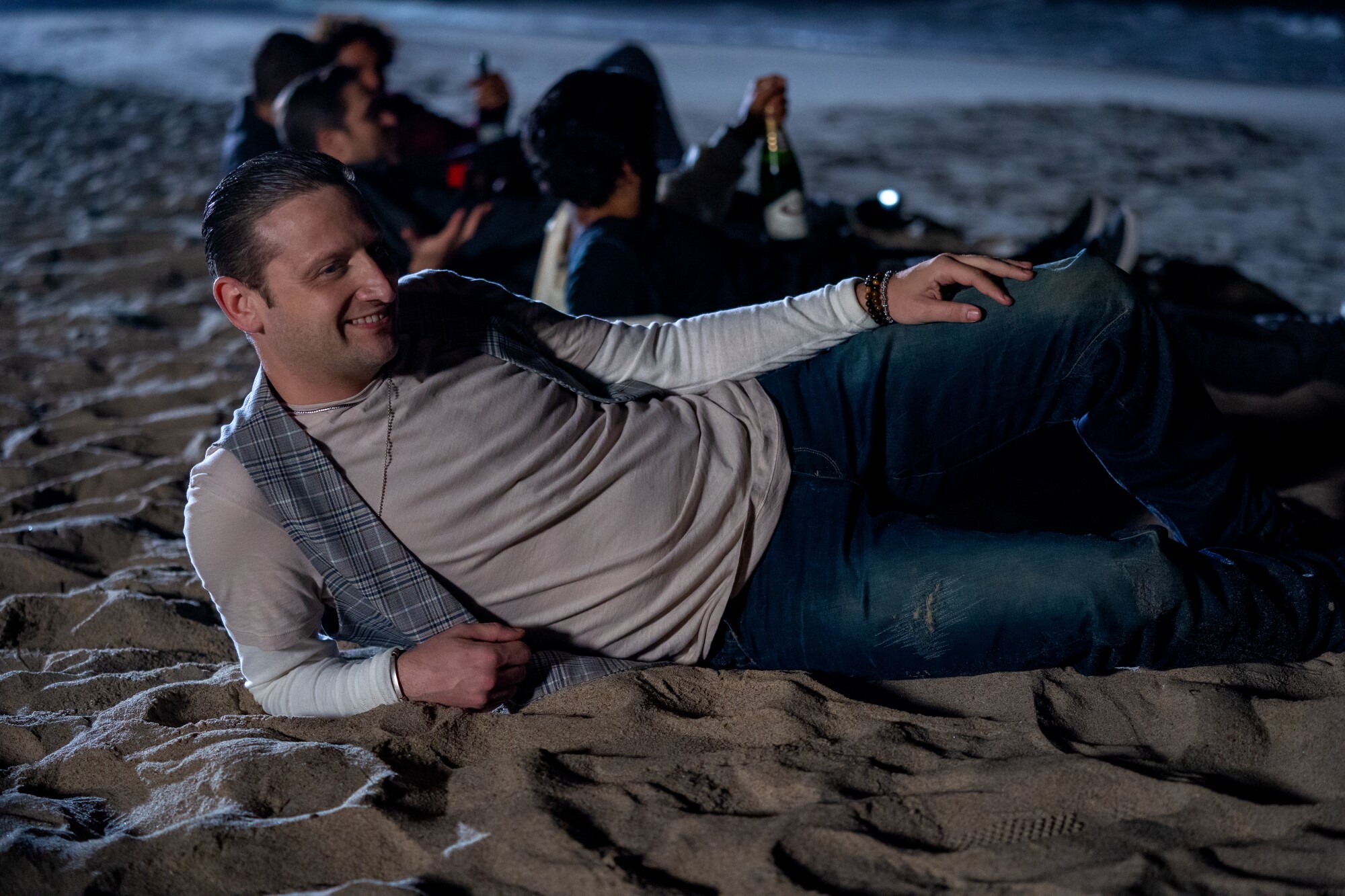Zach Kanin, left, and Tim Robinson.
(Dania Maxwell / Los Angeles Times)
Some reviewers have noted that the second season of “I Think You Should Leave,” the breakout sketch series fronted by comedian Tim Robinson, was more somber than the first. But don’t feel sorry for the schmucks Robinson plays, even when they start to cry.
Not even that poor Robinson character who goes undercover for a hidden-camera prank show in a hilariously bad old man costume with a grotesque prosthetic head — and when he gets inside a mall food court to mess with unsuspecting strangers, he freezes and goes limp with despair, sighing: “I don’t even want to be around anymore”?
“Well, yeah, but with that line in particular, I feel like he’s lying,” Robinson says, laughing. “He’s saying anything in the moment to get out of his current situation.”
That, in a nutshell, is what “I Think You Should Leave” is all about. The new season offers plenty of variety — a ghost tour, a “Shark Tank” parody, a commercial for a show called “Coffin Flop” — and guest stars including Tim Heidecker, John Early and Bob Odenkirk.
But because the entire series mostly flows out of the absurd brains of Robinson and his co-creator, Zach Kanin, it’s variations on a theme: An odd and painfully awkward person gets into a sticky social situation, embarrasses him- or herself and digs an ever-deeper and elaborately funnier grave in a desperate attempt to escape the cringeworthy moment.
Robinson and Kanin became friends while writing for “Saturday Night Live” a decade ago, and they made the short-lived Comedy Central series “Detroiters” before creating the Netflix sketch phenomenon. They’re currently editing the pilot for “Computer School,” a scripted comedy starring Robinson for HBO Max.
The big difference between the two seasons of “I Think You Should Leave” was, of course, a pandemic — although Season 2 was all written prior to the global event, and Robinson says the virus situation didn’t kill the vibe when they were shooting. The other difference is subtler.
“Zach and I talk about this all the time,” Robinson says. “What you find funny each year you do comedy — I feel like it gets narrower and narrower. So there are things from Season 1 that I feel like we probably wouldn’t have written in Season 2.”
There are constants though, including farts, hot dogs, fake products, babies and grown men acting like babies. Each sketch is intercut with brightly colored graphics and bits of upbeat soul songs.

Tim Robinson in season 2 of “I Think You Should Leave.”
(Saeed Adyani / Netflix)
“They make you feel good,” Robinson explains, “and they’re like a burst of energy. A lot of the people in the sketches are, like, annoying, and a lot of them are bad people. So I think it’s nice, living with this person for a few minutes or whatever, to have a nice …”
“… palate cleanser between sketches,” Kanin tags on.
One of the uncanny things about the show is how it turns guests — whether Heidecker as a slick dude on a date at an alien-themed bar or Early as a guy who refuses to pick up the tab at a group dinner — into surrogate Tim Robinsons. It’s not just the escalating ridiculousness of their dialogue, but how their body language oscillates from simmering to shame-faced to enraged.
That isn’t because they’re doing an impression, Robinson insists. It’s simply that “we circle certain situations all the time, as opposed to somebody being like me or seeming like me. It’s probably just how the show is.”
There’s almost no improvisation, so every actor commits to the absurdity and off-kilter dialogue they’re provided. One exception was the sketch comedy legend from “Mr. Show,” which was a major influence on Robinson and Kanin. In his sketch, Odenkirk plays a lonely guy in a diner booth next to a father (Robinson) and his daughter who gets recruited by Robinson to help sell an innocent dad lie about why they can’t get ice cream. Naturally, the weird lonely guy takes the lie too far.
“Bob did improvise a bunch at the end of that sketch,” Robinson says. “It was all really funny, and I feel like it elevated the sketch off of what was on the page a lot.”
Robinson and Kanin spend a lot of time sequencing each episode, “trying to put them together in a way that you don’t lose momentum as the episode goes along,” Kanin says.
By the time they reach the editing phase, watching a sketch over and over and over, “there’s always a point where you start to lose perspective,” Robinson notes. “It’s a dangerous point, too, because you’ll just cut anything.”
Their solution is basically the philosophy of the Robinson type in every sketch: Double down. If it was funny once, just commit.
Based on the internet’s reaction to the show, these sketches have staying power. People watch them more than once, quote them and dress as characters with their gaudy shirts and fedoras with safari flaps. “I Think You Should Leave” has joined that rarefied air of sketch comedies that return with interest. The guys don’t think about that when they’re writing it, though.
Says Robinson, “We just want the stuff that we’re doing to make us laugh.”

